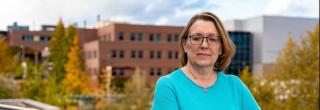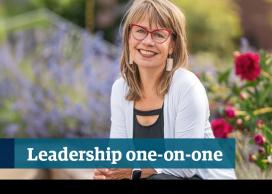Dr. Marie Tarrant is Dean of the Faculty of Health and Social Development and professor in the School of Nursing at UBC Okanagan.
She was appointed to the role of Dean in January 2023. Prior to this, she was Director of the School of Nursing. Before joining UBC in 2016, Dr. Tarrant served as Deputy Head and Professor at the School of Nursing in the University of Hong Kong. During her career, she has also practiced as a community and public health nurse in rural and remote areas of Canada, including the far north.
Dr. Tarrant is the lead investigator in the School of Nursing Maternal and Child Health Lab and is a frequently cited UBC expert on maternal and child health issues. Her research focuses on breastfeeding and maternal and childhood vaccine hesitancy, including COVID-19 vaccine hesitancy.
Q1. What quality do you most admire in a leader?
MT: Generosity of spirit and support are truly admirable traits in leaders – those who are willing to support the people they are supervising and genuinely want to see them grow in their career. Some of the best leaders I worked with are those who were not only focused on their own career, but were just as dedicated to mentoring their colleagues to advance to the next level. These experiences have played an instrumental role in shaping my leadership style.
Q2. What makes you laugh?
MT: I try to laugh and find joy in everything. I believe finding humour in situations makes them easier to deal with. My kids say the funniest things and make me laugh all the time. I also enjoy working with people with a good sense of humour who can look at the lighter side of things in life.
Q3. Who inspires you, and why?
MT: I’m inspired by strong female leaders, especially those who were thrust into the spotlight by circumstance and rose to the occasion to become a driving force. Ruth Bader Ginsburg, Michelle Obama, Chrystia Freeland and Katharine Graham are a few names that cross my mind – they have left an indelible mark on people through their actions. I find it very inspiring to see how these women seized the opportunities that came their way. I also draw inspiration from reading biographies of female leaders.
Q4. For you, what makes UBC different?
MT: I thoroughly enjoy the collegiality of UBC. In the Okanagan campus, we know our colleagues and leaders and interact on a first-name basis. Having worked at various institutions that tend to be more formal, I appreciate this collegiality that shows how our community fosters an open, friendly and respectful work environment.
Q5. What is the most important lesson you’ve learned, in your career to date?
MT: You can make more change and make a difference – through evolution, not revolution. Universities are large institutions that are constantly evolving, and it is crucial to accommodate this understanding in our thought processes when we are implementing change. I often think we are akin to a cruise ship, not a speedboat, so I find value in implementing incremental change rather than change for the sake of it. I have also realized the importance of being intentional about change, so that it results in our collective growth and success.
Q6. How do you like to recharge?
MT: I am an avid knitter – a hobby I developed many years ago. I love how knitting lets me track my progress, pay close attention to detail, cultivate patience and go back and rectify my mistakes. I’ve knitted a variety of things over the years – smaller projects that can be completed in a few days, to longer terms ones, like a blanket, that span over a year. Knitting always energizes me!
I also lived in Hong Kong for 20 years, so I love to travel. In fact, I’m already thinking about my travels for the year ahead and hope to go to Europe in the summer and Singapore during the fall.
Q7. What is the best advice you were ever given?
MT: My mother always told me to get an education and be self-reliant. I think that was very sound advice, because education is something that cannot be taken away from you. Whether it is by acquiring a new skill or pursuing a degree, education is empowering because it paves the way for opportunities to create your own livelihood.
Q8. What do you value in your colleagues?
MT: I value colleagues who embrace collegiality and are team players. Considering the broader context in various situations is crucial, and therefore cultivating a warm and amicable atmosphere plays a pivotal role in fostering collective dedication towards achieving our objectives.
Q9. What do you hope will be your lasting impact at UBC?
MT: I have always done what I thought was in the best interest of our Faculty’s growth and expansion, with a strong focus on offering quality educational programs. I would like to be remembered and respected as someone who made a meaningful contribution to the great work being done by our Faculty and the university.
Q10. If you could have a super power, what would it be?
MT: My role requires me to wear multiple hats at work, so I wish I could be a proficient multitasker. Wouldn’t it be great to be able to do five things at once, and do all of them equally well?
Q11. How has your passion for research in maternal and child health, and work as a nurse in remote and rural settings, shaped your outlook in your role as Dean?
MT: Having lived overseas I’ve gained a global perspective and understanding of how people across different cultures and backgrounds think and do things differently. The biggest lesson from this experience was that I realized that there is no best way to do things. Everyone has a unique approach towards situations, and that necessitates considering diverse perspectives and viewpoints at work.
When it comes to maternal and child health research, it fascinates me because the work highlights the challenges of things we presume should be natural, such as parenting, childbirth and breastfeeding. However, people need help with these activities, and there is so much more to understand in this realm.
All my experiences have influenced how I approach my work. My focus lies in supporting and helping the people around me grow. By acknowledging the diversity of experiences and thought of the people I work with, I hope to help create an enriching experience for everyone.
Q12. What are the critical health challenges of our day and how are you shaping your Faculty’s strategic plan to ensure students are equipped to meet these challenges?
MT: Canada has a growing aging population, so students need to be equipped with the skills and experience to support them in the future. There are also severe shortages in the health care workforce and we are trying to address this gap through our education programs for health professionals.
Further, the escalating cost of healthcare is giving little returns in terms of quality of life. In view of this reality, we want to contribute to a broader discourse centred around how we not only need to improve healthcare but also enhance quality of life. This requires a considered shift in how we are approaching the challenges we are facing today, with a focus on population health improvement.
At UBC, we have the privilege of educating and training our future healthcare leaders, and it is critical that they have the skills to deal with these challenges, not just today or tomorrow, but for the next five, 10, 15 and 20 years and beyond. This is the cornerstone of my Faculty’s strategic plan. We recognize that healthcare professionals will face unprecedented challenges in the future, whether they be technological, societal or economic. Our primary goal is to prepare our students to be adaptable and nimble so that they can tackle these challenges in the future.
Published: February 20, 2024
Interviewed by: Aditi Ghosh-Mooruth, UBC Internal Communications



